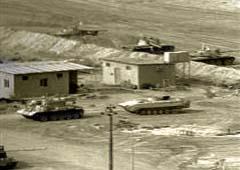Confessions by two members of the anti-Iran terror group, the Mojahedin-e-Khalq Organization, about torturing and mistreatment of members by MKO officials and commanders led to a siege of the group’s headquarters, Camp
Camp Ashraf has acted as the MKO’s headquarters and training base in Iraq’s Diyala Province for the past two decades. Baghdad had earlier vowed to shut down the camp and end the group’s presence in the country.
The move by Iraqi forces came after two members of the group disclosed top secret information to the Iraqi officials about psychological pressures and abuse of the members in the camp.
There are 3,416 people in Camp Ashraf, all fingerprinted and eye-scanned by the Iraqi officials.
The Iraqi government has vowed to expel the members of the terrorist group from the country, maintaining that their presence "in Iraq is not an option".
The US troops transferred control of the camp to Iraqi officials after Baghdad and Washington concluded an interim security agreement to take over the country’s national security issues.
The group, founded in the 1960s, started assassination of the citizens and officials after the revolution in a bid to take control of the newly established Islamic Republic. It killed several of Iran’s new leaders in the early years after the revolution, including the then President, Mohammad Ali Rajayee, Prime Minister, Mohammad Javad Bahonar and the Judiciary Chief, Mohammad Hossein Beheshti who was killed in bomb attacks by MKO members in 1981.
The terrorist group joined Saddam’s army during the Iraqi imposed war on Iran (1980-1988) and helped Saddam and killed thousands of Iranian civilians and soldiers during the US-backed Iraqi imposed war on Iran.
Since the 2003 US invasion of Iraq, the group has been strongly backed by neo-conservatives in the United States, who also argue for the MKO to be taken off the US terror list.


